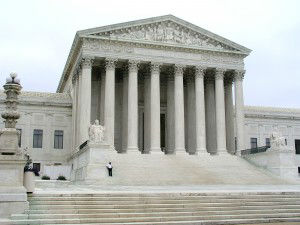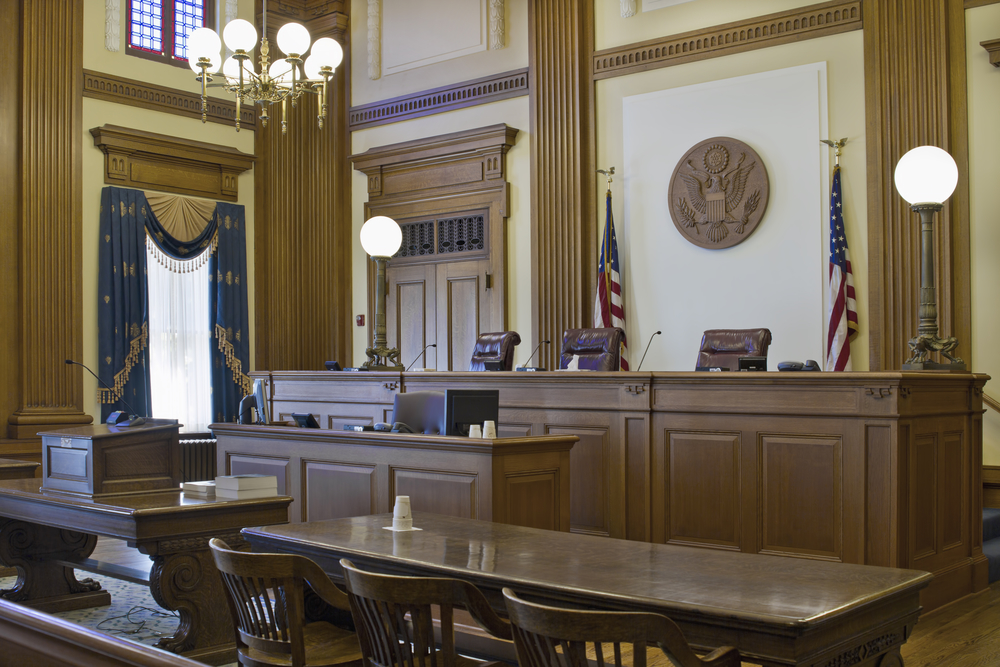The Supreme Court of New Jersey has agreed to consider how to apply the state’s Open Public Records Act (OPRA) to security camera footage. The case, Patricia Gilleran v. Township of Bloomfield, specifically involves whether a municipality must publicly disclose security video footage captured by a stationary camera in a municipal building. 
The Facts of the Case
Plaintiff Patricia Gilleran made a written OPRA request for security video recordings from a stationary camera located on the back of the Township of Bloomfield’s municipal building. She explained that she was looking for video recordings of a specific person entering or leaving the building. Bloomfield denied Gilleran’s request, citing that the recordings were not government records subject to disclosure under OPRA under the following exclusions: Emergency or security information or procedures for any buildings or facility which, if disclosed, would jeopardize security of the building or facility or persons therein; and security measures and surveillance techniques which, if disclosed, would create a risk to the safety of persons, property, electronic data or software.
Gilleran filed a verified complaint in the Superior Court, Law Division, and obtained an order to show cause. In the court proceedings that followed, she argued that the recordings would reveal “high-level Democratic officials and other politicians visiting the Municipal Building on an almost daily basis and having an influence upon the Town Administrators.” Meanwhile, the Township maintained that disclosing the footage could compromise the safety of visitors to the Law Enforcement Building adjacent to Town Hall, including confidential informants, witnesses, domestic violence victims, and members of the public who seek to report crimes. Bloomfield further agued that disclosure would jeopardize the security measures it has taken for Town Hall and its adjacent parking area and police building.
The Appellate Division’s Decision
In May, the Appellate Division upheld the trial court’s ruling that the Township had violated OPRA, holding that “Bloomfield did not satisfy its burden of proving the requested recordings are exempt from disclosure through the general statements of its Administrator and its argument for a blanket exemption.” In reaching its decision, the appeals court emphasized the trial court held correctly that the statutory exclusions do not provide a blanket OPRA exemption for recordings made from security cameras. Instead, courts must make individual determinations based on the specific facts and legal arguments presented.
The Issues Before the NJ Supreme Court
The New Jersey Supreme Court has agreed to consider the following question: “Does the Open Public Records Act require the Township to disclose video recordings from a security camera surveillance of the back of the Township’s municipal building (i.e., Town Hall).”
In its petition to the Court, the Township argued that the Appellate Division erred in finding that the Township Administrator’s Certification was insufficient to avoid disclosure of the video recording requested under OPRA and failing to recognize the significant effect such a decision will have on public entities in the State of New Jersey. The Township argued:
Although the Appellate Division held that the “legislators could not have contemplated that the OPRA disclosure requirement would engage the services of government employees to view video recordings from stationary surveillance cameras for hours upon hours to determine whether they contain confidential or exempt material” and acknowledges multiple people would possibly have to view a particular video tape to determine whether or not there is exempt material, the decision in essence would often times require it.
As for the practical implications of the ruling, the Township stated:
Such a decision could result in governmental entities simply turning off their video surveillance equipment, or not increasing their security measures, simply to avoid going to the extent set forth in the Appellate Division opinion in order to qualify the record for exclusion.
Due to the increased use of video surveillance cameras, the Court’s decision is expected to have a significant impact. It will also be the first time the New Jersey Supreme Court will address the OPRA exclusions regarding security information and procedures. We will be closely tracking the status of this case and encourage readers to check back for updates.
For more information about the OPRA case or the legal issues involved, we encourage you to contact a member of Scarinci Hollenbeck’s Government Law Group.
The U.S. Supreme Court’s new term began earlier this month. The Justices have already agreed to consider several cases that could impact New Jersey municipalities. This post offers a brief preview. 
Public Unions: In Friedrichs v. California Teachers Association, the Supreme Court will reconsider its long-standing precedent in Abood v. Detroit Board of Education, 431 U.S. 209 (1977). In Abood, the Court held that the First Amendment does not prohibit governments from requiring non-union public employees to pay their “fair share” of dues for collective bargaining, contract administration, and grievance adjustment. In addition to addressing whether Abood should be overruled, the Court will consider the First Amendment implications of requiring public employees to “opt-out” of subsidizing a union’s political and ideological activities, rather than requiring public employees sympathetic to the union’s activities to “opt-in.”
Redistricting: The Court will consider two cases regarding the redistricting process. After upholding Arizona’s use of an Independent Redistricting Commission (IRC) last term, the Supreme Court will now review the constitutionality of its newly drawn legislative districts in Harris v. Arizona Independent Redistricting Commission. The issues before the Court are two-fold: 1) whether the IRC violated the one-person, one-vote principle when it crafted uneven legislative districts, which enhanced minority voting ability but also diluted the vote of one political party’s voters; 2) whether the IRC may justify the creation of such uneven legislative districts by pointing to its desire to obtain preclearance from the U.S. Department of Justice Department, which had the authority to reject redistricting changes under Section 5 of the Voting Rights Act (VRA).
The second issue is complicated by the fact that Arizona was required to obtain preclearance at the time the IRC crafted its redistricting map in 2011. But that is no longer the case after the Court’s decision in Shelby County v. Holder, __ U.S. ___, 133 S. Ct. 2612 (2013), which invalidated the formula – also known as Section 4 of the VRA – used to identify which States are subject to the preclearance requirement. Congress has not adopted a constitutionally-acceptable formula since.
In Evenwel v. Abbott, the Court will determine whether the “one-person, one-vote” principle allows States to use total population, rather than eligible voter population, when apportioning state legislative districts.
Out-of-State Lawsuits: In Franchise Tax Board of California v. Hyatt, the Court will address what happens when State governments are sued out-of-state. The Justices agreed to specifically consider the following issues: (1) whether the Full Faith and Credit Clause or principles of comity require Nevada to extend to sister States hauled into Nevada courts the same immunities Nevada enjoys in those courts; and (2) whether Nevada v. Hall, 440 U.S. 410 (1979), which permits a State to be hauled into the courts of another State without its consent, should be overruled.
Section 1983 Claims: The Court will also consider a New Jersey lawsuit brought under 42 U.S.C. § 1983. Heffernan v. City of Paterson involves whether the City violated the First Amendment rights of a veteran police officer when his superiors demoted him based on their perception that he supported a challenger to the incumbent mayor. The specific question before the Court is “whether the First Amendment prohibits the government from demoting a public employee based on a supervisor’s perception that the employee supports a political candidate?”
We will be closely tracking the status of the above cases, as well as any other public government cases that are added to the Court’s docket. We encourage you to check back regularly for updates and visit the Scarinci Hollenbeck Constitutional Law Reporter for in-depth coverage of the Supreme Court’s new term.
For more information about any of the above cases, we encourage you to contact a member of Scarinci Hollenbeck’s Government Law Group.
Last month, the Supreme Court of New Jersey held in Redd v. Bowman that challengers to the City of Camden’s decision to regionalize its police force proposed a valid ordinance to maintain the existing police structure. However, the state’s highest court ultimately concluded that the related referendum petition could not go before voters because too much time had passed since it garnered the necessary voter signatures in 2012, specifically citing that it no longer reflected the current status of Camden’s police force.
The Facts of the Case
In an effort to decrease expenses while expanding police presence in the City, the City of Camden decided to disband its municipal police department and to contract with Camden County for the delivery of police services to the City of Camden by a countywide police department. In response, a group of City voters, acting as a Committee of Petitioners (Committee), attempted to block the regionalization of the City’s police services by invoking the Optional Municipal Charter Law (Faulkner Act). The Committee submitted an initiative petition for the adoption of a proposed ordinance that would have required the City of Camden to create and maintain its own police force, and would have enjoined the City from disbanding its municipal police force and replacing it with a countywide police force.
Plaintiffs, Dana L. Redd, Camden’s Mayor, and Camden’s Council President Francisco Moran filed a complaint seeking to enjoin the Committee’s Faulkner Act initiative. They argued that the proposed initiated ordinance unlawfully restrained the City’s legislative power and that it was preempted by the Municipal Rehabilitation and Economic Recovery Act (MRERA), the Special Municipal Aid Act (SMAA), the Transitional Aid to Localities program (TAL), the Local Budget Law (LBL), and the Police Force Act.
The trial court found that the proposed ordinance constituted an invalid divestment of the City’s legislative authority. The Appellate Division reversed the trial court’s judgment and remanded for a determination of whether the state fiscal statutes preempt the proposed ordinance. Before the Committee’s appeal was argued in the Appellate Division, Camden’s municipal police force was disbanded. Since May 1, 2013, the Camden County Police Department, Metro Division, has provided police services to the City of Camden.
The Court’s Decision
The New Jersey Supreme Court concluded that the proposed ordinance neither effected an unlawful divestment of legislative power nor was it preempted by state statutes. However, it still found that the relief sought by the Committee in its 2012 petition could not be granted in a manner consistent with the Faulkner Act because the outdated ordinance does not reflect the current status of Camden’s police services. As Justice Anne Patterson explained:
Because the reorganization that the ordinance was intended to forestall was completed more than two years ago, the ordinance as drafted is inconsistent with current circumstances. Accordingly, the ordinance may no longer be supported by all of the citizens who backed it with their signatures, and it cannot meaningfully be evaluated by the voters. The presence of an out-of-date ordinance on the ballot would contravene the Faulkner Act’s objective that voters be presented with a clear, understandable proposed ordinance that they may accept or reject as they see fit.
In light of the court decision, Justice Patterson instructed that the committee “must start anew with an ordinance that reflects the facts as they now stand.”
For more information about the court’s decision or the legal issues involved, we encourage you to contact a member of Scarinci Hollenbeck’s Government Law Group.
In Fair Share Housing Center v. Zoning Board of Hoboken, et al., the Appellate Division considered five consolidated appeals filed to determine the enforceability of an affordable housing ordinance adopted by the City of Hoboken. The appeals court ultimately determined that the ordinance was enforceable, overturning the trial court’s ruling.
The Facts of the Case
The four developers named as defendants in the lawsuit received significant relief from the City of Hoboken’s zoning laws in the form of variances from the Zoning Board of Adjustment (Zoning Board), conditioned upon the developers’ compliance with the City’s affordable housing ordinance. The Fair Share Housing Center (“FSHC”) filed four individual actions in lieu of prerogative writs seeking declaratory and injunctive relief against the Zoning Board and the private developers. FSHC specifically sought compliance with the City’s affordable housing ordinance in the form of a judicial declaration that any zoning approvals the developers received be deemed void or enjoined, unless each one filed a “plan of compliance” with the affordable housing ordinance.
In response to the suits, the developers asserted a number of affirmative defenses, which included challenging the validity, enforceability, and constitutionality of Hoboken’s affordable housing ordinance. The trial court held the ordinance was unenforceable because it had not been submitted to the Council on Affordable Housing (COAH) for review. Accordingly, the court invalidated the zoning approval conditions imposed by the Zoning Board of Adjustment, relieved the developers from their obligation to provide affordable housing, and enjoined the City from imposing any requirement to construct affordable housing units and/or collect any monetary contribution related to affordable housing.
The Court’s Decision
The Appellate Division reversed. The court noted that with the Supreme Court decision in March effectively eliminating the requirement of submitting ordinances to COAH, and delegating that responsibility to the courts, that option was now moot. The Supreme Court’s decision was rendered subsequent to the decision of the trial court. The Appellate Division also held that the trial court erred in invalidating the zoning approval conditions related to compliance with the affordable housing ordinance’s provisions.
“The trial court misconstrued the [Fair Housing Act] and the case law applying it. There is no provision in the FHA or regulations promulgated by COAH requiring municipalities to submit all ordinances that impact a municipality’s affordable housing obligation to COAH for approval,” the opinion states. The Appellate Division also reversed the invalidation of a section in the ordinance providing for voluntary payments in lieu of compliance with the ordinance’s affordable housing obligations. The court held that the payment in lieu section of the ordinance did not need COAH’s approval.
According to the Appellate Division, the trial court interpreted the New Jersey Supreme Court’s decision in Holmdel Builders Ass’n v. Holmdel, 121 N.J. 550 (1990) too broadly, erroneously concluding that every municipality with an affordable housing obligation must submit to COAH for approval of its plan to meet that need.
“[T]he trial court misconstrued the purpose and role the Legislature intended COAH to play in assisting municipalities in fulfilling their constitutional obligation to provide a realistic opportunity for the construction of their fair share of the present and prospective regional need for low and moderate income housing,” the Appellate Division explained. “The substantive certification process available to municipalities under N.J.S.A. 52:27D-313(a) is entirely voluntary.” The Appellate Division remanded the case back to the trial court for further proceedings “to adjudicate the remaining legal issues raised by the parties.”
For more information about this case or the legal issues involved, we encourage you to contact a member of Scarinci Hollenbeck’s Government Law Group.
In Morillo v. Monmouth County Sheriff Officers, the New Jersey Supreme Court held that government officials were entitled to qualified immunity for civil rights claims arising under the New Jersey Civil Rights Act (NJCRA), N.J.S.A. 10:6-2 and the federal Civil Rights Act of 1871, 42 U.S.C. 1983. Most importantly, especially in the false arrest context, the court circumscribed the analysis in terms very narrow and favorable to law enforcement officials. When analyzing whether qualified immunity shields officers accused of false arrest under the NJCRA, the single dispositive query is: whether the undisputed facts show that no reasonably competent police officer would have arrested the plaintiff.

The Facts
On the evening of December 15, 2010, Monmouth County Sheriff’s Officers Alexander Torres and Thomas Ruocco sought to execute a child-support warrant on plaintiff Eric Morillo. Ruoco located Morillo and another person sitting in a parked car near the side driveway of the residence. The residence belonged to Morillo’s mother, though he claimed he stayed there from time to time. Morillo was in the passenger seat smoking marijuana. When Morillo stepped out of the vehicle to be searched, he advised Ruoco he had a loaded handgun buried in his waistband. The officers arrested Morillo on the child-support warrant.
On the way to the police station, Morillo advised the officers that he legally owned the handgun and had documents to support his claim. At the police station, the officers discussed whether Morillo should be charged with a weapons offense. Absent a valid exemption or a carry permit, New Jersey law prohibits a person from carrying firearms outside their home, place of business, or other land owned or possessed by him. Morillo was found in the driveway of the residence (which the officers assumed was his home), leading to the question of whether a driveway is part of the home. After discussing the matter with the prosecutor and obtaining his blessing, the officers charged Morillo with violating N.J.S.A. 2C:39-5(b)(1). Due to the physical location of the home, the matter was ultimately dismissed by the Monmouth County Prosecutor’s Office and re-filed in Middlesex County.
On March 30, 2011, after learning that Morillo had legally obtained the handgun, the Middlesex County Prosecutor’s Office dismissed the charges. In his report, the prosecutor explained that the charge lacked merit because Morillo “was found on his own property with a handgun” and, thus, was exempt from prosecution based on N.J.S.A. 2C:39-6(e), which is an exception to N.J.S.A. 2C:39-5(b). Morillo spent almost one month in jail due to the weapons charge.
Morillo subsequently filed a civil rights complaint against Ruocco, Torres, and their supervisor, Sergeant Steven Cooper, alleging false arrest and imprisonment under Section 1983 and the NJCRA. Morillo claimed the officers lacked probable cause to arrest him. The trial court denied the officers’ motion for summary judgment on qualified immunity grounds. After agreeing to hear the matter on an interlocutory basis, the Appellate Division affirmed the denial, finding there were genuine issues of material fact. The New Jersey Supreme Court reversed, holding that the officers were protected by qualified immunity.
The New Jersey Supreme Court’s Decision
The Legal Framework : Qualified Immunity
Citing its prior decision in Gormley v. Wood-El, 218 N.J. 72 (2014), the court reiterated that the NJCRA should be interpreted coextensively with its federal counterpart, Section 1983, when analyzing qualified immunity. Trial courts must conduct a two-step inquiry: 1) do the facts alleged, taken in the light most favorable to the plaintiff, “show that the challenged conduct violated a statutory or constitutional right,” and 2) was the right “clearly established” at the time of the incident. If the answer to either query is “no,” the government official is entitled to qualified immunity. The two-step inquiry may be decided in any order.
On the “clearly established” prong – which is where most qualified immunity defenses rise or fall – the court unreservedly acknowledged the “significant hurdle” it poses for plaintiffs in civil rights cases. Following the United States Supreme Court’s lead, the court held that “‘existing precedent must have placed the statutory or constitutional question’ confronted by the official ‘beyond debate.’” In other words, courts must review the applicable law and determine whether it would have placed a reasonable officer on notice that his actions were unlawful.
The court also offered specific guidance in false arrest cases, which should assist defense counsel in presenting the qualified immunity defense. False arrest cases generally revolve around whether probable cause existed to support the arrest or, even if it did not, whether a reasonable officer could have believed it existed. The court tipped the scale in favor of the defense, holding that if reasonable officers could disagree on whether probable cause exists, the doctrine of qualified immunity applies. Thus, the query for lower courts “depends on a single determination: whether the circumstances support a conclusion that no reasonably competent officer would have concluded that a warrant should issue. “
Finally, the court instructed trial courts to decide the issue of qualified immunity “well before trial,” including on summary judgment. The question of immunity is one for the court. Any genuine issues of historical fact (i.e., was the plaintiff resisting arrest, was the device, in fact, a handgun, etc.) should be decided by the jury using special interrogatories.
The Court Grants Qualified Immunity To The Officers
After articulating and then applying the principles of qualified immunity to the case before it, the court entered judgment in favor of the officers. In examining the “clearly established” prong, the court reviewed New Jersey precedent to determine whether the driveway of a home not owned by the accused could fall within the statutory exemption provided by N.J.S.A. 2C:39-6. Finding the statute’s language ambiguous, and finding that New Jersey jurisprudence failed to place the legal issue “beyond debate,” the court reversed the lower courts’ decision and entered judgment in favor of the officers.
For more information about the court’s decision or the legal issues involved, we encourage you to contact a member of Scarinci Hollenbeck’s Government Law Group.
In State v. Ivonne Saavedra, the Supreme Court of New Jersey held that a school board clerk could be criminally indicted for taking confidential documents from the North Bergen Board of Education. In so ruling, the court rejected the defendant’s arguments that that Quinlan v. Curtiss-Wright Corp., 204 N.J. 239 (2010), immunized her conduct and prohibited her prosecution because the public documents at issue were taken for use in employment discrimination litigation.

The Facts of the Case
Ivonne Saavedra, an employee of the North Bergen Board of Education (Board), filed an employment discrimination lawsuit against the Board. In discovery, her attorney produced several hundred documents that allegedly had been removed or copied from Board files. According to the Board, the documents included highly confidential student educational and medical records that were protected by federal and state privacy laws. The Board reported the alleged theft of its documents to the county prosecutor.
Prosecutors presented the matter to a grand jury, which indicted defendant for official misconduct and theft by unlawful taking of public documents. Among other arguments raised in her defense, Saavedra argued that Quinlan shielded her from prosecution because the public documents at issue were taken for use in employment discrimination litigation. In Quinlan, the Supreme Court of New Jersey held that an employee has a legal right to take confidential documents from their employer to use in employment discrimination litigation. The trial court denied the motion, and the Appellate Division affirmed the trial court’s determination.
The Court’s Decision
The court held that the trial court properly denied defendant’s motion to dismiss her indictment, specifically concluding that defendant’s indictment does not violate due process standards or New Jersey public policy by conflicting with the Court’s decision in Quinlan.
The Supreme Court held that Quinlan concerned the legal standard that governs certain retaliation claims under the New Jersey Law Against Discrimination (LAD) and did not govern the application of the criminal laws in this case. In Quinland the plaintiff was able to maintain a retaliation claim under LAD after being terminated from her position for taking documents from her employer for use in an ongoing employment discrimination litigation. The Court concluded that this civil retaliation did not immunize Saavedra from criminal prosecution for official misconduct or theft.
“[T]he Court’s decision in Quinlan did not endorse self-help as an alternative to the legal process in employment discrimination litigation. Nor did Quinlan address any issue of criminal law,” Justice Patterson explained. “Indeed, nothing in Quinlan states or implies that the anti-discrimination policy of the (state’s Law of Discrimination) immunizes from prosecution an employee who takes his or her employer’s documents for use in a discrimination case.”
However, the Court noted that its decision did not preclude defendant from asserting, as an affirmative defense at trial, that she has a claim of right or other justification based on New Jersey’s policy against employment discrimination, because she removed the documents from her employer’s premises in order to use them to prosecute her civil claim. “The trial court will be in a position to evaluate any such assertion in the setting of a full record regarding defendant’s conduct, the content of the documents, the Board’s policies regarding the records, and the impact of federal and state privacy laws,” the panel stated.
For more information about the court’s decision or the legal issues involved, we encourage you to contact a member of Scarinci Hollenbeck’s Government Law Group.
In a 5-4 decision, the U.S. Supreme Court struck down a municipal ordinance enacted by the City of Los Angeles. In City of Los Angeles v. Patel, the majority held that the ordinance, which authorized police to inspect motel registration records without advance notice, violated the Fourth Amendment of the U.S. Constitution.
Factual Background
Under the ordinance at issue, hotel and motel operators are required to collect and record detailed information about their guests in either paper or electronic form. The records must contain: the guest’s name and address; the number of people in the guest’s party; the make, model, and license plate number of the guest’s vehicle if the vehicle will be parked on hotel property; the guest’s date and time of arrival and scheduled date of departure; the room number assigned to the guest; the rate charged and the amount collected for the room; and the method of payment. Pursuant to the ordinance, this information must be kept for a period of ninety (90) days.
As previewed in an earlier post on this blog, the challenged ordinance also contains a warrantless inspection requirement, which states that hotel guest records “shall be made available to any officer of the Los Angeles Police Department for inspection,” provided that, “[w]henever possible, the inspection shall be conducted at a time and in a manner that minimizes any interference with the operation of the business.” Failure to comply with an officer’s inspection demand is a misdemeanor, punishable by up to six months in jail and a $1,000 fine.
The Supreme Court’s Decision
The majority of the Supreme Court held that the Los Angeles ordinance was unreasonable under the Fourth Amendment, because hotel owners are subjected to punishment for failure to turn over their records without first being afforded the opportunity for precompliance review.
In reaching its decision, the majority confirmed that facial challenges to ordinances and statutes (as opposed to challenges to particular applications of statutes), are permitted under the Fourth Amendment . Justice Sonia Sotomayor, in delivering the majority opinion of the Court, stated that “(f)acial challenges under the Fourth Amendment are not categorically barred or especially disfavored.” The majority also confirmed that government records inspections could constitute “searches” under the Fourth Amendment.
With regard to the ordinance, the Court held that the provision of the Los Angeles Municipal Code that requires hotel operators to make their registries available to the police on demand is facially unconstitutional because it penalizes them for declining to turn over their records without affording them any opportunity for pre-compliance review. According to the ordinance, a hotel owner who refuses to give an officer access to his or her registry can be arrested on the spot. The Court ultimately found that this type of requirements is “unreasonable” and business owners cannot be put to this position.
Most importantly, the decision appears to create a bright-line rule for administrative searches. According to the Court, “absent consent, exigency, or the like, in order for an administrative search to be constitutional, the subject of the search must be afforded the opportunity to obtain precompliance review before a neutral decisionmaker.”
The majority’s decision mandates that an “opportunity for precompliance review” is necessary for almost all governmental inspection programs, excluding only those in four closely regulated industries (firearms dealing, liquor sales, mining, and automobile junkyards). Accordingly, New Jersey public entities are advised to review their governmental records or conditions inspection programs for compliance with Patel.
For more information about the court’s decision or the legal issues involved, we encourage you to contact a member of Scarinci Hollenbeck’s Government Law Group.
In Grabowsky v. Twp. of Montclair, the Supreme Court of New Jersey held that municipal officials could be disqualified from voting on redevelopment matters if they belong to organizations that may be impacted by the project. Under the newly established conflict of interest rule, when a public official serves in a substantive leadership role in an organization that brings or opposes a zoning application or that is the owner of property within 200 feet of the property in dispute, he or she is precluded from voting on the matter.
The Facts of the Case
The dispute centers on a single-parcel redevelopment area located at 63-65 Church Street in Montclair (Church Street Lot). In 2012, the Township of Montclair adopted Ordinance 0-12-28, which amended one of the town’s redevelopment plans to include an assisted living facility as a permitted use for the Church Street Lot. Plaintiff Richard Grabowsky filed an action in lieu of prerogative writs against the Township of Montclair and the Planning Board, challenging the validity of the Ordinance.
Among other allegations, Grabowsky asserted that Mayor Jerry Fried and Councilman Nick Lewis should have been disqualified from voting on the redevelopment ordinance. In support of that argument, he cited the fact that both Fried and Lewis were members of the Unitarian Universalist Congregation Church located next to the parking lot to be redeveloped. Grabowsky also cited New Jersey statutes that require notice to property owners within 200 feet of a site subject to zoning changes, N.J.S.A. 40:55D-62.1, and a site plan adoption, N.J.S.A. 40:55D-12(b).
The trial court dismissed the suit and the Appellate Division affirmed. While the appeals court acknowledged that disqualification is required when the official’s “direct or indirect private interests may be at variance with the impartial performance of their public duty,” it found that any potential benefits the church might obtain from the redevelopment were “far too speculative for consideration in determining whether Fried and Lewis had a disqualifying conflict of interest.”
The Court’s Decision
The New Jersey Supreme Court disagreed. Applying the Municipal Land Use Law (MLUL) and the Local Government Ethics Law, it found that a conflict of interest may have disqualified Fried and Lewis from voting on the challenged ordinance.
The court declined to adopt a bright-line rule under which the interest of a church or other organization is automatically imputed to all of its members. Rather, it established the following test: “When a church or other organization owns property within 200 feet of a site that is the subject of a zoning application, public officials who currently serve in substantive leadership positions in the organization, or who will imminently assume such positions, are disqualified from voting on the application.“
In reaching its decision, the court emphasized that its conflict of interest rule is narrow and should not deter public officials from becoming involved in private organizations. “In the rare circumstance in which public responsibilities and volunteer commitments conflict in a land use dispute, the public official should refrain from involvement in the matter. With careful attention to the potential for conflicts between public responsibilities and private affiliations, officials may effectively assist organizations and preserve public confidence in the integrity of local government,” the court explained.
After determining that issues of fact existed, the court remanded the case to the trial court to determine whether former Mayor Fried and/or Councilman Lewis served or were about to serve, in substantive leadership positions in the adjoining church when the ordinance first passed.
For more information about the court’s decision or the legal issues involved, we encourage you to contact a member of Scarinci Hollenbeck’s Government Law Group.
In 388 Route 22 Readington Realty Holdings, LLC v. Township of Readington, the New Jersey Supreme Court addressed the circumstances under which a municipality may exercise its discretion to repurchase unused sewer capacity. While the state’s highest court ultimately upheld the sewer ordinance, it concluded that its blanket policy of not recapturing unused sewer capacity improperly limited development.
The Facts of the Case
In 1999, the Readington-Lebanon Sewerage Authority (Authority) began to expand its plant capacity. To finance its access to the increased capacity, the Township of Readington sold the unused capacity on the private market. Each landowner purchasing future sewer capacity entered into a sewer allocation agreement with the Township.
The Township also enacted an ordinance that established a methodology for allocating sewer capacity to landowners as well as recapturing unused capacity. Pursuant to the ordinance, in the case of those development projects which have not received approval by the appropriate Township board having jurisdiction at the time a request for gallonage is made, allocation agreements shall provide that if the applicant does not make formal application to the appropriate Township board within two years of approval of the allocation, then the Township Committee may, in its discretion, terminate the agreement. The ordinance also provides that if within two years after preliminary approval, construction has not commenced, the Township Committee may, at its discretion, terminate the agreement.
388 Route 22 Readington Realty Holdings, LLC sought to develop property in the Township, but its septic tank did not have the capacity to process the expected wastewater. Accordingly, it requested that the Township recapture sufficient sewer capacity to allow its construction project to proceed. Consistent with its policy of not repurchasing capacity, the Township declined to do so. The plaintiff filed suit, alleging that the municipal ordinance addressing the allocation of sewer capacity, was invalid either on its face or as applied by the Township.
In the lawsuit that followed, the trial court affirmed the validity of the ordinance. However, it further determined that the Township’s blanket policy of not recalling unused sewer capacity violated the New Jersey Supreme Court’s decision in First Peoples Bank v. Township of Medford, 126 N.J. 413, 420-21 (1991), which held that a “[t]ownship must retain sufficient control to assure that sewer permits are either used or repurchased so that others may use them.” As a remedy, the trial court ordered that the Township undertake, within ninety days, a review of the unused sewer capacity listed by plaintiff and provide a reasoned basis for not recapturing that capacity. The Appellate Division reversed, and the plaintiff appealed.
The Court’s Decision
The New Jersey Supreme Court agreed with the trial court. It held that a “blanket policy of not recapturing unused sewer capacity is the functional equivalent of a moratorium on development.” Accordingly, it ordered the Township to perform a detailed analysis of the unused capacity in the hands of private parties and to explain whether any of that capacity can be recalled.
With regard to the ordinance itself, the court held that it provides adequate standards to guide the exercise of municipal discretion when considering the repurchase of permits, noting that the ordinance sets temporal limits on the right of a property owner to keep unused sewer capacity and provides that an allocation agreement may be extended for good cause. As further explained by the court:
This ordinance, as written, in no way suggests that the Township as a matter of law has delegated its authority to control land use — and more specifically to control access to sewer capacity — to private parties. The ordinance suggests that access to sewer capacity is to be managed by the Township Committee for the general welfare of the community.
With regard to the validity of the ordinance as applied, the state Supreme Court agreed with the trial court that the Township’s obligation to terminate agreements, when appropriate, was not dependent on whether plaintiff could “beg, borrow or cadge capacity from others.” According to the justices, “[T]he Township’s no-buy-back policy has rendered the ordinance toothless, and, as the trial court determined, ‘functioned as a de facto moratorium on any development which requires sewerage.’”
Going forward, the NJ Supreme Court ordered the Township to determine whether any unused capacity can be recaptured to satisfy the plaintiff’s development needs.
It outlined the following factors that should taken into account when exercising its discretion: (1) the length of time a landowner has possessed unused sewer capacity, (2) the development plans of the landowner to tap some or all of the unused capacity and the imminence of that happening, (3) the complexity of the development project and the importance of the project to the community, (4) whether the economy has retarded economic development, (5) proposed development projects by others that cannot proceed because of unavailability of sewer capacity and the importance of those projects to the community, and (6) any other relevant factors.
For more information about the court’s decision or the legal issues involved, we encourage you to contact a member of Scarinci Hollenbeck’s Government Law Group.
The City of New Brunswick recently settled a lawsuit challenging two ordinances intended to restrict panhandling. One ordinance required a permit to solicit charitable contributions, while the other made it unlawful to beg or solicit food or monies on any street or sidewalk within the city.
The plaintiff, a homeless man prosecuted under the anti-panhandling ordinance and represented by the New Jersey Coalition to End Homelessness, alleged that the local laws violated the First Amendment of the U.S. Constitution and Article 1, Section 1 of the New Jersey Constitution. In December, the plaintiffs won an injunction to halt enforcement of the ordinance. The parties settled the case last month.
According to a press release issued by the City of New Brunswick, it plans to introduce two new ordinances that will address panhandling and the regulation of solicitation of donations. New ordinances will be introduced. This must be done within 90 days, as per the terms of the settlement agreement and the two challenged ordinances will be repealed. Under the terms of the settlement, New Brunswick will also pay $3,000 in attorney’s fees and make a donation to Elijah’s Promise, a local soup kitchen.
In the wake of the settlement, the American Civil Liberties Union of New Jersey (ACLU) has indicated that it plans to challenge anti-panhandling ordinances across the state. “We hope this settlement would be a cautionary note to other towns who are enforcing other laws like this,” Deb Ellis, executive director of the New Jersey Coalition to End Homelessness, said.
While many cities and towns have strengthened their panhandling laws in recent years, their constitutionality has still yet to be fully addressed. In Massachusetts, the City of Worcester adopted an ordinance prohibiting “coercive or risky behavior by panhandlers, other solicitors, and demonstrators seeking the attention of motor vehicle drivers.” The district court and First Circuit Court of Appeals upheld the law, although the ACLU has appealed to the U.S. Supreme Court.
In light of these developments, New Jersey municipalities should review their anti-panhandling ordinances with local counsel to determine if any changes are needed.
For more information about the case or the legal issues involved, we encourage you to contact a member of Scarinci Hollenbeck’s Government Law Group.






